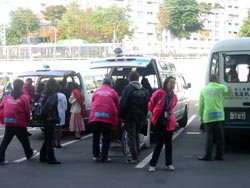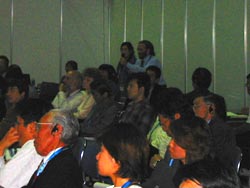|
2002.Oct.17th news
flash
|

DPI WA Daily Bullentin "HitoBito"
| v@ Every Road Leads to Convention on Human Right |
| Independent Living : Creating regional & global networks @Workshop "Independent Livig"was chaird by Konkkola, Kalle (Finland). Its sub theme was "Creating Regional & Global Network." At the beginning, the four presenters discussed how each regions understand the word, "Independent Living"and how peoples with disabilities can improve their living qualities. Pak Chano reported "independent living network." He implied that independent living was basic human rights for all people, and the time has come for people with disabilities in Asia to change their mindset. @Rosangela Berman _Bieler (Brazil) presented a broad overview of independent life in Brazil and Latin America. She implied that understanding the concepts of IL (independent living), making use of it, and deciding self-determinations of their living way are important. Moreover, she brought up that we can overcome difficulties by altering our state of consciousness, by developing it, and by cooperating with universities. @Nakanishi Shoji (Japan) brought up the support to Asia and the role of DPI. He asserted that the role of DPI is to organize independent living centers through grass roots movements in every country and to admonish governments to improve conditions. Furthermore, based on developments in this decade, he appealed for even more active community movements. @Yutta Fricke(Canada) discussed the advocacy of human rights and various grass roots movements. She addressed the important question of how should we advance.E Finally, she emphasized the vital importance of having a computer network through which people can exchange information. @After Lively question are raised, the chairman raised and confirmed the fact that there are differences among each country, and she claimed that self-determinations, peer-counseling, supports, and self-help movement are important for independent living. |
| Bioethics:Genetics &@discrimination @In the session, Gregor Wolbring claimed, "It is explicitly stated in theArticle 6 of points of Universal Declaration on Human Rights that every person can't be discriminated by gene standards. In fact, even though it is prohibited from discrimination of antenatal sex difference, live-birth abortion is allowed if the babies are suspectedhave disabilities. It is discrimination. @"Six years ago, the time of my giving birth, my doctor suggested me to have an abortion because my baby had a possibility of an inherited disability. Yuho Asaks presented her own experience "Three of my friends were forced to give up their babies. To choose a doctor, and to persuade my parents was the first step to fulfill my hope. @"Although many people believe that disabled people must be unfortunate, we are able to change their stream of consciousness. I would like to bring word of our precious lives to them". @Then Michael Stein proposed that the research of GENOMU causes the discrimination of employment for people having the inherited disability, and the ADA law was useless for solvig this problem. @Simon Jean-Luc from France insisted that we should invest in the Independent Living, not in bioethics, and finally this confirmed the opinions; (1) the right of diversity (2) the right of the children (3 )the concept of ability. |
| Disabled Women Human Rights~ @Speakers are Kaambwa Orient from Zambia, Djikine Hatouma Gakou from Mali, Sara Georgeson from New Zealand, Michiko Osanai from Japan. @Because of invasion of privacy and the poverty, not only many women, but also people with disabilities have been discriminated. In other words, women with disabilities have been disturbed their human rights in the double reasons of as sex and disability. Especially, many women with disabilities have been suffering from their right to education, giving a birth, having a property, and the right to work. @Many of the disabled women probably have difficulties of having both their partner and fiance. Also, their incomes are relatively low. I believe that we need to act for strong movements to advance the rights of the disabled women. We have to insist that they have human rights, and that their rights should be protected . |
| Development: Impact of poverty on disability @Mkanga from Tanzanua said, "It has been said that there are approximately four hundred million disabled people living in developing countries. In urban areas, even people with severe disabilities can expect to live long lives owing to relatively advanced medical care. Malnutrition, the lack of preventive inoculations, polluted drinking water, and other factors have traditionally been the causes of various disabilities. Poverty produces disabled people, and vice versa; there is a vicious circle between poverty and the creation of disabled people. In developing countries people generally enjoy insufficient public services in areas such as welfare, medical treatment, education, and employment. People with disabilities are excluded from being productive and society' decision making process, resulting in earning their living as beggars. In short they are treated as inferior human beings. Education is a very important means for reducing the causes of poverty, making it the means for sustainable development." @ Apiagyei from Ghana said, "In Ghana poverty can be seen anywhere. The lack of any effective policy, especially the absence of law against the discrimination of disabled people, has accelerated the situation inspired by the poverty they have suffered. We, as an NGO addressing this issue, have watched to see if they could get any affirmative benefit from the "Strategy for Reducing Poverty,"which was declared in 1983." @ Finally all the participants confirmed that the remarks should be included in the Sapporo Declaration. They proposed "All the governments should treat the disabled people as human being with their own ability, hopes, and aims for lives,""The people should be conferred the right for education, and especially children with disabilities should be conferred the relevant right for education in their earlier time." |
| 16th PM@Session 9F Inclusion & cooperation - impaired groups who are not active in DPI
Ishii, Masayuki & Matsumoto Manabu (Japan) O'Hagan, Mary (New Zealand) Rae Hurrell (Australia) @Workshop 9 on Oct. 16 was consisted of groups which has not been active in DPI. Taking "DPI plan for action" in mind, each organization reported its activities and made proposals. The most impressive speech was done by "Unique Face." This group is to support persons who have "disfigurement in face and body because of connate illness and acquired accident or burn. On January 2002 the group was chartered as non-profit organization by Tokyo prefecture. @"There are potentially several hundreds thousands of people who are facing difficulties and suffering for interpersonal relations because of disfigurement of their faces. Especially at the first meeting, I hesitate to meet someone although he or she looks embarrassed. There also are many cases those who have Unique Faces could not find job because of their face. Whenever they meet someone, they have to be asked about their faces and to explain their reasons; so, it causes difficulties with social engagement. Even if it is serious, it is considered as just small problems." @The organization has several missions for examples to support those who have disfigurement in their faces and to train professionals such as callous physicians. Once a month the organization also holds peer counseling or open meetings. @Finally, Ishii said "we have come to Sapporo to encourage that several hundreds thousands of people who have disfigurement in their face should come out, and to make the public think about them." |
@We had interviews Shafics (Pakistan) and Anpor (Thailand). Both are from Asia. We found a lot in common from these two. Their impressions of Japan was "We could say Japan is the most comfortable country for disabled persons in Asia accessible enuironment it is wonderful in a facility aspect, so we hope to realize attituclimal barrier-free" in the future. @Concerning to this DPI Assembly, itself," This is a wonderful Assembly. There is a possibility to acquire a lot of knowledge by means of getting people together, exchanging a lot of opinionsh. @Over the final two days, we,dpi participants could assimilate more and more knowledge in the assembly. |
 |
 |
Tomonori Taki@yA volunteer for transporta tion z @"I got a chance to spend my time as a volunteer for the World Assembly through my job. I brought some wheelchairaccessble vehicles from the main island of Japan for making a better transportation convenient. Although I have an enough confident of how to manage a transportation smoothly in a imitated space of parking lots and limited short time since attending a volunteer training program, the only thing I have a difficulty is communicating with people in foreign languages. The most important work will be seeing all the participants off to the airport. I am going to do my best for making all participants happy and hope all of them have a safe trip to their countries.
@In this congress, she works hard as a language volunteer of English. @She applied this position to know more about the problems concerning disabled people. She told us that it's hard work and she felt a sore foot sometimes. But she also think this is a very precious opportunity for her. @We want to say thanks for her enthusiasms. @In the 2 days left, Nao, hold out please!! |
| ¦ΝF | kCΉV·Π | kCΉR[ | Lmr[GDy |
- return -




